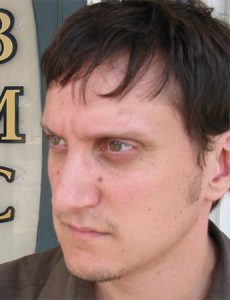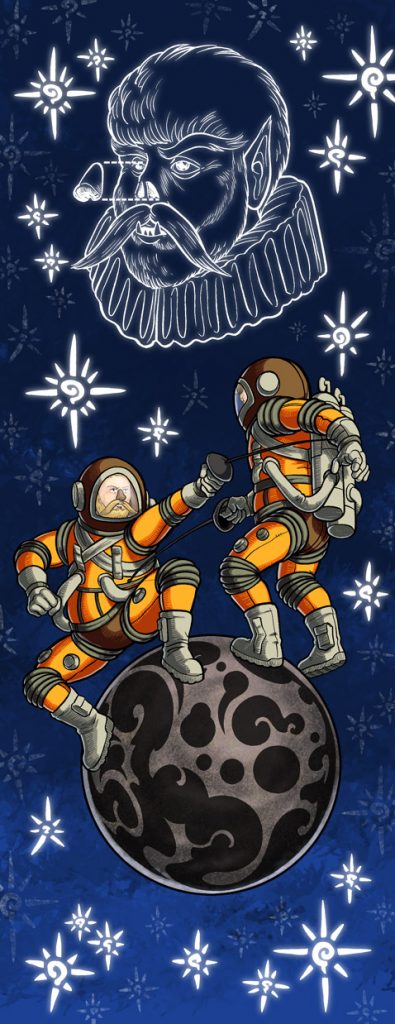illustration by Elaine M. Will
The moon is Gilbert Klee’s passion, like transcendence to an ascetic or whisky to a drunk. By candle’s light, he handwrites long letters to the Soviet space program. “Dear Comrades,” he says, “congratulations on sending up your dog. The Soviet people have once again proved their genius. One day I will buy the commemorative stamp, but first, allow me to get down to business by saying, You fools! How blindly you rush into the cosmos, heedlessly provoking the moon . . .”
Klee presents his new conference paper, sensing that the critic Lawrence Talbot is sitting in the front row. Klee ignores him, acts like he doesn’t recognize him. His heart is a pool of eels. He clutches at his notes, clears his throat, and begins:
“Our planet was once a molten mass. When gravity pulled the heaviest elements toward the centre, the centrifuge caused the Earth to spin faster. Six trillion gallons of liquid drifted skyward to a distance of two hundred and forty thousand miles, solidifying into the moon that we now see above us. The remaining crevasse in our planet filled with water and became the Atlantic Ocean. No scientist will disagree with these facts. But consider this: if both bodies, Earth and Moon, are composed of the same materials, mineral and biotic, it stands to reason that both worlds have developed the same flora and fauna.”
Klee gazes up from the page and sees a world of possibility. He is determined to prove, once and for all, that life exists on the moon. This is not an outdated notion—he is simply able to glance forward and backward at once. He understands the future and yet reveres the past, much like his idol Tycho Brahe.
Tycho: Not long ago, we thought that the Earth was the centre of the universe and that everything revolved around us! We were wrong. All of the planets revolve around the sun. Except for the Earth! The sun still orbits the Earth, but now the rest of the planets orbit the sun.
Klee: You are aware of the work of Copernicus?
Tycho: Nicolaus Copernicus is a liar and a troublemaker! If we truly moved around the sun, our perspective of the stars would constantly shift. Therefore, what Copernicus presents us with is merely a dream—a delusion!
Klee: But Mr. Brahe, what would you say if, three hundred years from now, scientists were able to develop a telescope strong enough to prove that our perspective does indeed shift?
Tycho: Telescope? Now you are inventing words!
Although Tycho Brahe is not always right, his confidence is admirable. Tycho is a man of great legend, holding one percent of the entire wealth of Denmark, owning a tame moose and a clairvoyant dwarf named Jepp, and being the first astronomer to have ever witnessed the birth of a new star (which he labels a nova). Most importantly, he possesses the world’s most famous nose: a brilliant prosthesis crafted of pure silver.
Klee also tries to be interesting. For example, he doesn’t believe in the new style of bicycle and refuses to own one. But still, he is not so stubborn as to make a spectacle of himself by riding around on the old style of bicycle. Klee contents himself to walk from place to place, occasionally scoffing at the new cyclists. For now, let the ignorant fools pedal to and fro—Klee will be satisfied to hold congress with history’s greatest philosophers.
Anaxagoras: How can you imagine creatures living on the moon, when it is clearly two-dimensional? Before you answer me, just look at it.
Klee: But sir, the moon is a sphere, just as the Earth is a sphere. Note its phases, its orbit, etcetera.
Anaxagoras: The Earth is most certainly flat, boy! Watch your mouth—you offend the widows of sailors who have fallen off the edge. Look you—the moon is a celestial pie plate!
Klee: Then eat this piece of pie off of it.
Anaxagoras: (whimpering) I would, but I’m on a no-pie diet.
Having bested the greatest mind of Asia Minor, Klee sits down to brunch. He picks up the newspaper, flips to the astronomy section, and reads:
DELUSION REIGNS AT LOCAL CONFERENCE
Lawrence Talbot
Although the possibility of moon life hasn’t been taken seriously for over a century, Gilbert Klee does not seem to be aware of this reality. His beliefs are worthy of a chortle and perhaps a guffaw, but in terms of scientific merit, Klee’s cosmology is as rational as the image of pocketwatches melting over tree limbs. His posturing accomplishes nothing but to discredit the work of serious astronomers, and I dare say even some carnival tent astrologers. It is a mystery how any university allows him to stand at a podium, despite the fact that . . .
Klee visits the master jeweler to order his own silver prosthetic nose. He imagines himself lecturing on an archaic Spanish island where he overhears the critic spout, “Klee is philosophically inept—I do say, not the least bit ept!” Klee growls, “Cur, thou hast maligned me for the last time!” He then scratches a pentagram in the sand, summoning the spirit of Tycho Brahe, who presents both men with rapiers. They duel. Talbot strikes first, removing Klee’s nose with a single stroke. Klee exclaims “Haha!” reaches into his breast pocket, and produces the silver prosthetic. Once he has applied it, he draws back and spears Talbot though the heart. “That ought to prove once and for all that there is life on the moon!”
Aquinas: We need not resort to swords, my good man. Do not forget the principle of the first mover. We know that a moon rock has been thrown through the air. The rock cannot throw itself. So who has thrown it? A moon man, of course.
Pascal: But why would a moon man throw a rock?
Aquinas: Very good question. This moon man must be an odious and detestable creature, much like Lawrence Talbot.
Pascal: Then we ought to believe in him. Even if he does not exist, we have nothing to lose in believing. But can you imagine if we did not believe in him and he did exist? Then we would lose a great deal.
Aquinas: We cannot afford to not believe in him—this much is clear.
Pascal: I am glad that we agree with each other, Aquinas.
Aquinas: And I am glad that we both agree with Gilbert Klee.
Klee gives a special acknowledgement to Pascal and Aquinas in the introduction to his new book, A Treatise on Moon Life. Talbot, in his review: “Perhaps in another century he could have garnered support from ill-educated syphilitic nobility, but in today’s market this book can only find itself alongside other antiquated books of superstition. In short, this man is completely lacking in heart, intelligence, and imagination. There is no blood in either his writing or his body.”
Newspaper stand line-ups get longer and longer, Talbot’s articles making the front page after the passing of every full moon. For Klee, even this proves the existence of moon life by allegory—the symbiosis of two men sharing one passion. Klee is the Earth, a rock of science. Talbot is his ghost, a moon broken free of his body, breeding mutant strains of insecurity from Klee’s own mind, orbiting him eternally, creating chaos in the oceans of his soul.
In response, Klee grinds his teeth until the enamel breaks, then refuses to get them fixed. He will prove himself to be a man unafraid of change. This decision is met with astonishment from his dentist, who asks what will happen when his molars become so jagged that they cut up the inside of his mouth. “I will leave them until I’m unable to go on,” replies Klee, “and then I will die.”
He enters the washroom stall and unbuckles his belt. As he turns toward the stall door, he scans for the latest graffiti. There is only one entry of note, reading: professor klee is a lunatic haha get it? He curses the critic, drenching his pants (it feels as though he is wringing out his entire body). Could it be a full moon night, Talbot stalking him once again?
He visits his mother. “Mother, is this tree the same height as when I was a child?” She says “Yes, it has been dead for many years.” He plucks an apple and bites into its crispness, his teeth surging with pain.
He sees life through a blur of rain, committing acts that he regrets even as the dawn approaches. There is only one cure for this: a woman who truly loves and understands him, with a pistol and a silver bullet. But to understand, and yet love—he laughs for a moment at the paradox, and then resumes his tears.
Tonight is a full-moon night. He sits in the dark, carefully considering his next words.
 Joel Katelnikoff has recently finished writing SCROLL / NETWORK / HACK, a book on inventive writing in early ASCII e-zines. He lectures at the University of Alberta. His heart is a pool of eels.
Joel Katelnikoff has recently finished writing SCROLL / NETWORK / HACK, a book on inventive writing in early ASCII e-zines. He lectures at the University of Alberta. His heart is a pool of eels.





Great work, Joel. Love your creative mind!